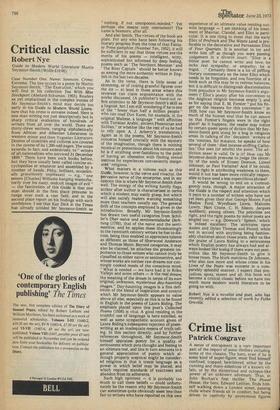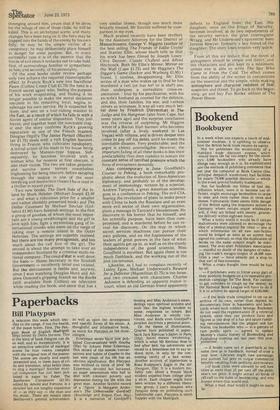Crime list
Patrick 'Cosgrove
A sense of entrapment is a very important' part of the impact of some thrillers including some ot the classics. The hero, even if he is some kind of super-figure, must find himself confined, trapped, bewildered, either by the cunning and many-sidedness of a known villain, or by the mysterious and octopus-like power of an unknown adversary. Thus, in John Buchan's first thriller, The Power House, the hero, Edward Leithen, finds himself walking down a London street, passing clubs where friends sit in comfort, but being driven to captivity by anonymous figures
thronging around him, aware that if he dives for the refuge of one of those clubs, he will be killed. This is an archetypal scene, and many changes have been rung on it: the hero may be trapped into the hands of the enemy by his own folly; he may be the, simple victim of a conspiracy; he may deliberately place himself in danger for some purpose. But, in every successful case it is of the essence that the forces of evil stretch tentacles out to take hold, first, of surroundings familiar or sympathetic to him; and secondly, of his personality.
Of the nine books under review perhaps only two achieve the required claustrophobic effect. In Francis Ryck's new one Sacrificial Pawn (Collins Crime Club £1.70) the hero is a French secret agent who, feeling the purpose of his work evaporating, and finding it no longer possible to make the moral decisions reauisite to his remaining loyal, begins to sabotage his own service. He is suspected by them, and sent on a hair-raising mission to the East, as a result of which he falls in with a Soviet agent of similar disposition. They join forces, and together meet the inevitable tragic end: the story confirms Ryck's growing reputation as one of the French masters. Douglas Orgill's The Jasius Pursuit (Macmillan £1.75) deals with a rich English baronet, living in France, who cultivates lepidoptery. A trivial action of his leads to his house being destroyed by Manson-type hippies. Subsequently, he becomes involved with a woman who, for reasons at first obscure, is also their victim. The two are taken prisoner, and survive some terrors nonetheless frightening for being obscure, before escaping through the mailuis in one of the most terrifying and destructive chases I have read in a thriller in recent years.
Two new books, The Dark Side of the Island by Mark Hebden (Michael Joseph £2.40 — and what a ridiculous price for a smaller and rather shoddily presented book) and The Dollar Covenant by Michael Sinclair (Gollancz £1.90) have Scottish settings. In the first a group of goodies, of whom the most important are a young ornithologist and the girl in love with him, fight a mysterious gang of international crooks who seem on the verge of taking over a remote island in the Outer Hebrides. The settings are superbly realised, but there are too many protagonists, and too much about the calf love of the girl. The second is about the attempt to take over an independent Scotland by a criminal multi-national company. The coup d'etat is well done; the hero.— Home Secretary in the Scottish Government — excellently bitter and twisted. But the denouement is feeble and, anyway, since I was watching Douglas Hurd and Andrew Osmond's gripping Scotch on the Rocks (still available from Collins) on television while reading the book, and since that has a very similar theme, though one much more brutally treated. Mr Sinclair suffered by comparison in my eyes. Much praised recently have been thriller5 by the Assistant Attorney for the District of Massachusetts, George V. Higgins (author of the best selling The Friends of Eddie Coyle) and Stanley Ellin, whose blurb tells us that his work has been filmed by Joseph Losey Clive Donner, Claude Chabrol and Alfred Hitchcock. Both Mr Ellin's Mirror, Mirror on the Wall (Cape E1.75) and Mr Higgins's The Digger's Game (Secker and Warburg £1.95) I . found, I confess, disappointing. Mr Ellin writes of a man who wakes up to find he has murdered a tart (or has he? or is she?) an then undergoes a surrealistic cross-examination / trial by his psychiatrist, with his ex-wife's husband as counsel for the defence, and she, their families, his son, and various others as witnesses. It was all very much better done by Friedrich Dtirrenmatt in The Judge and his Hangman (also from Cape, but some years ago) and the surprise conclusion was the reverse of surprising. Mr Higgins wrote of a Boston Irish barman who becomes involved (after a lively weekend in Las Vegas) with villains, and is driven deeper into crime to pay off his debts, until he meets the inevitable disaster. Very predictable; and the argot is almost unintelligible. However, the important failing of all these books is less their predictability than their inability to sustain the constant sense of terrified pressure which the form of entrapment demands.
Also contemporary is June Goodfield's Courier to Peking, a book remarkably prophetic about the evolution of Sino-American diplomacy, and probably so of the development of immunology, written by a scientist. Andrew Tanyard, a great American scientist, goes to a conference in Peking. The evil CIA, fearing the revelation of plans to make peace with China to both the Russians and an even more evil sector of their own organisation, plant a message in Tanyard's bloodstream. He discovers to his horror that he himself, and his scientific purpose, have been thus compromised, and is murdered before he can reveal his discovery. On the way in which secret services machines can pursue their own policies, and on the haplessness of the leaders of great powers in the face of what their agents get up to, as well as on the sturdy independence of the good scientist, Miss Goodfield is excellent. But again there is too much flashback, and the working out of the plot too tenuous. Likewise, as I had to complain recently of Lesley Egan, Michael Underwood's Reward for a Defector (Macmillian £1.75) is too loose, and two crowded with characters. Charles Ashmore is defending an apparent traitor in court, when an old German friend apparently defects to England from the East. His daughter, once on the fringe of Security, becomes involved, as do two departments of the security service, the grim interrogator Wragg, and Mr Underwood's egocentric hero Jerome Bowyer, formerly a boy friend of the daughter. The story loses tension very quickly.
From all this we deduce that the novel of entrapment should be simple and direct, and the characters and plot kept to a minimum, unless one is able to write The Spy Who Came in From the Cold. The effect comes from the ability of the writer to concentrate on the essential and the simple, while making atmosphere and character redolent of fear, suspicion and threat. To go back to the beginning: go and buy Pan Books' edition of The Power House.



































 Previous page
Previous page